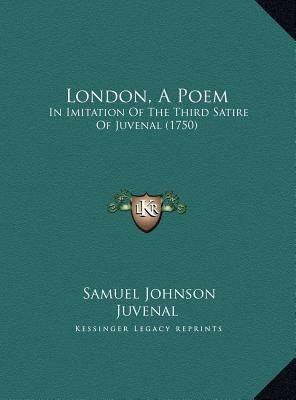Representation Of City Life In Johnson's London
Jun 29, 2019 • 1396 views

London was written by Samuel Johnson and published in 1738 anonymously. It follows the eighteenth century Neoclassical tradition and is an imitation of juvenal's third satire. In the poem Thales, a friend of the poet, is disillusioned with the vices of the capital city London and preparesto go the Cambria, a rural countryside. After Thales' introduction by the poet, Thales enumerates the vices of London. It is a hub of all sorts of activities-communication, finance trade, entertainment, governance and fashion and these are guarded by sycophants and corrupted politicians.
The epigraph states that for who, however steels himself, can bear the absurdity of their city, and restan his rage. J.P. Hardly states as a poem on the evils of city life, London exploits a familiar theme. The devastating components counted by Thales were to be met in the eighteenth century capital. 'Thirst of power and gold' has 'lulled' people of thoughtless age into servitude and overthrown their 'rebellious virtue'. It is a place where 'malice, rapine, accident, conspire'. The social and moral fabric is tainted with bribery, corruption and flattery. Poverty is considered as the greatest sin and is hated more than crime. Poors, the section of society which needs to be uplifted, is frowned upon whereas criminals are raised to the level of 'lords of the street and terror of the way'. Richard Schwartz has described eighteenth-century London as associated aptly with pickpockets, highwaymen, smugglers and robbers.
J.P. Hardy asserts that the poet links the corruption of the whole city with the current political scene. The character of Orgilio represents the then administrator Robert Walpole under the monarchy of George 2. Walpole was considered the "fountain head of corruption" who continued his reign through bribery and acquired wealth from his flatterers.
London became the 'common shore of Paris and of Rome', it has been infested politically and economically by Spain and culturally by France. The art of flattery and servility to patrons are 'admired, prefered, carest'. The sycophants 'exalt each trifle, every vice adore' whereas 'true Briton can't puzzle right or varnish wrong', 'they are disgusted' as Harriet Raghunathan explains "decline of British liberty and cultural influence of French manners in London." Among the verses of flattery, the "tumultuous cries" of public is subdued.
The venal life of a city is accentuated by its contrast to the countryside representing an "ideal of virtuous simplicity and the possibility of national rejuvenation" which is marked in the city. The countryside is a place where "harras'd BRITON found repose" and still upholds traditional moral and social virtues.
The poor people who had merit worth but no social patron cannot accomplish themselves as slow rises worth, by poverty deprest, 'But here more slow, where all are slaves to hold'. The city of London is flooded with relentless ruffians, fell attorney, falling houses, bribed followers and midnight murderers who have tainted the fabric of London.
London needs a man who prefer a "virtuous simplicity over corrupting luxury, cultivate sturdy independence instead of sycophantic dependence and bring to moral ugliness and decay a new vitality and beauty", and Johnson is that man.
